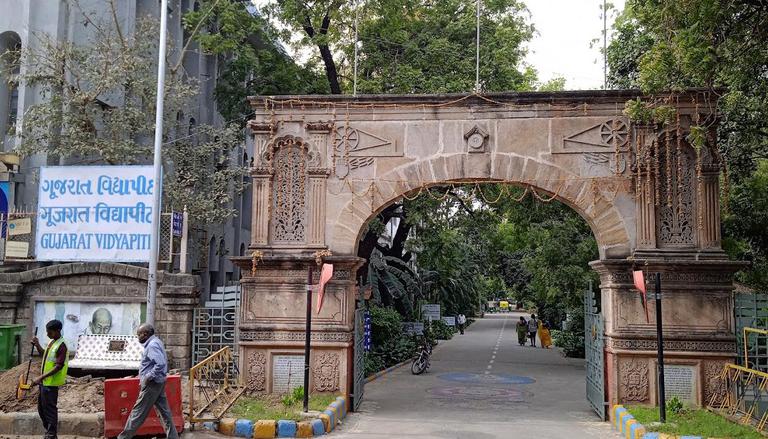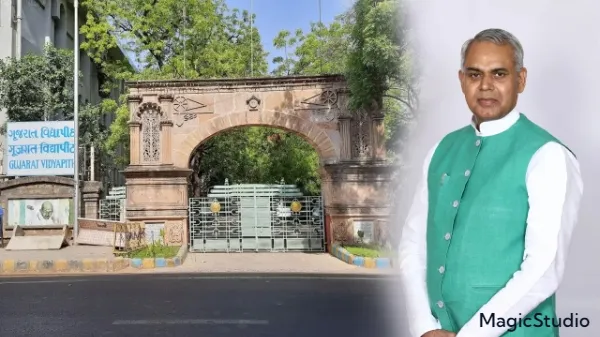Rajkotupdates.news: GaGujarat Vidyapeeth By Mahatmandhi In 1920 Will Invitegovernor Acharya Devvrat
The trustees of Gujarat Vidyapith have resolved to request Governor Acharya Devvrat take responsibility as the institution’s Chancellor, according to a press statement issued by Gujarat Vidyapith general secretary Nikhil Bhatt. Mahatma Gandhi established Gujarat Vidyapith on October 18, 1920. Rashtriya Vidyapith was established after the non-cooperation movement. In March 2015, Ela Bhatt was selected to serve as chancellor. She informed the trustees of her resignation a few months ago, citing health concerns, and asked that she be replaced as chancellor.
Nikhil Bhatt announced in the statement that the board of trustees had accepted her resignation, effective October 19. The Board of Trustees will send a team to meet with Governor Acharya Devvrat and ask that he assume the role of Chancellor. Sources said that out of 26 Vidyapith trustees, 24 were present at Tuesday’s meeting. According to our informants, eight trust members opposed inviting the governor to take over as Chancellor.

On October 4, the Gujarat Vidyapith Council convened. After careful consideration, the university in Ahmedabad has accepted Chancellor Ela Bhatt’s resignation out of respect for her circumstances. It also confirmed Bhatt’s employment until October 19.
In addition, Governor Acharya Devvrat of Gujarat was unanimously chosen to become the university’s 12th Chancellor. It has been announced that a group from Gujarat Vidyapith will invite the governor. Bhatt, who is 89, recently asked the trustees to choose a replacement after she resigned as Chancellor. After former Chancellor Narayan Desai resigned in March 2015, the institute founded by Gandhi was led by the recipient of the Ramon Magsaysay Medal. On October 18, 1920, Mahatma Gandhi established the Gujarat Vidyapith, and he remained its Chancellor for the rest of his life.
His successors as Chancellor of the 102-year-old university include such notable figures as Sardar Vallabhbhai Patel, Dr. Rajendra Prasad, and Morarji Desai. In June of 2019, Acharya Devvrat became the Governor of Gujarat. He had been the governor of Himachal Pradesh before that.
The Background of the Gujarat Vidyapeeth
The Gujarat Vidyapeeth, founded by Mahatma Gandhi in 1920, has been an essential part of India’s educational history. The organization has significantly benefited people’s cultural, intellectual, and professional growth nationwide. It has also allowed them to realize their ambitions and develop their interests. Here, we’ll examine the origins and development of Gujarat Vidyapeeth.
Philosophy and Theory
The Gujarat Vidyapeeth was established by Mahatma Gandhi in 1920 to spread an education rooted in Indian culture and tradition. Gandhi’s theory of Nai Talim, which stresses the oneness of knowledge and activity and the necessity of education to serve the broader welfare of society, was crucial in the formation and ideology of the Gujarat Vidyapeeth.
The Gujarat Vidyapeeth is now more important than ever as a place where students can learn about all aspects of life and grow as people. Science, art, business, law, teaching, and management are just a few of the disciplines represented at this school.
The thousands of students who have come through the doors of Gujarat Vidyapeeth have been influenced by the school’s vision of fostering education based on Indian values. The institution is essential to the modern world because it values developing well-rounded, socially responsible, and globally aware citizens.
Gujarat Vidyapeeth is a great place to begin your education if you thirst for information and are interested in understanding Indian culture and values. The school’s dedication to delivering a well-rounded education can help kids acquire the attributes they need to thrive in the modern world.
Leadership and Its Formative Years
In 1920, Mahatma Gandhi established Gujarat Vidyapeeth as an autonomous center for vernacular language education. The building was a metaphor for India’s fight for independence, centered on Swadeshi values like rural development and self-rule. To this day, Gujarat Vidyapeeth remains committed to its original mission of serving as a catalyst for positive social change and national advancement.
To provide students with a well-rounded education, the university has developed several departments and faculties in areas such as the arts, sciences, commerce, social work, law, and education. Distance degree programs have also been introduced by Gujarat Vidyapeeth, allowing students from even the most remote locations to gain access to a university degree.
The alumni of Gujarat Vidyapeeth have made significant contributions to society. Many of these alums have gone on to do great things for their communities and the country as leaders, activists, and changemakers in their areas. In sum, Gujarat Vidyapeeth’s dedication to education and social transformation is crucial in determining India’s long-term trajectory.
The Process of Evolution and Speciation
Education, cultural and intellectual advancement, and social consciousness have all benefited from Gujarat Vidyapeeth’s long and varied history of innovation and adaptation. Gujarat Vidyapeeth, founded by Mahatma Gandhi in 1920 to revitalize Indian education via the medium of the national language, had a significant impact on the trajectory of the Indian freedom fight and the conception of “Swaraj,” or self-rule.
Gujarat Vidyapeeth has been at the forefront of rural development, women’s empowerment, and social transformation through its academic programs and research centers for decades, and that tradition continues today. Its mission is to cultivate expertise and individuals who will contribute to the growth and prosperity of humankind. Overall, Gujarat Vidyapeeth exemplifies the potential of education as a force for positive social change.

















